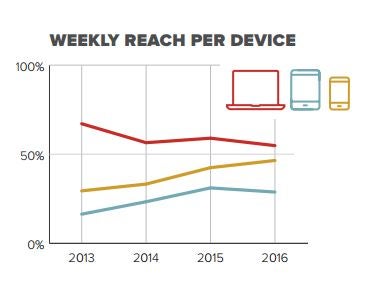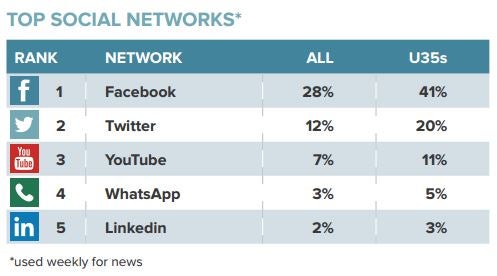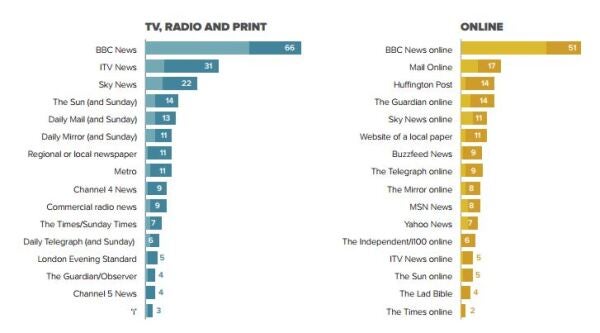
The news brands who originate stories are “clearly noticed” by readers less than half the time when journalism is read on social media in the UK, according to a new report.
The continued growth of news distributed on social media is one of three trends, revealed today in the 2016 Digital News Report by the Reuters Institute for the Study of Journalism, that is putting “severe pressure” on existing media business models.
A clear move to mobile for accessing news content and the rise of ad-blocking software make up a triple threat to news media, the study finds.
The report is based on an online Yougov survey of more than 50,000 people in 26 countries, including the UK and the US, carried out in January/February of this year. Each country has a sample size of roughly 2,000 respondents.
Across the entire sample, half (51 per cent) said they used social media as a source of news each week – that figure is 35 per cent in the UK alone and 46 per cent for the EU as a whole – with about one in ten (12 per cent) saying it was their main source.
How UK readers access online news content:

Among the social media channels, Facebook was found to be “by far the most important for finding, reading/watching, and sharing news” with 28 per cent of respondents in the UK using it weekly for news, rising to 41 per cent for the under 35s.
Social media is more important among the women surveyed, the report states, with 28 per cent globally saying it is their man source of news, beating television for the first time at 24 per cent within the demographic.
More than half of the global survey sample (53 per cent) uses a smartphone to access news content – at a record 46 per cent in the UK alone – while tablet use is said to be “flattening out” and computer use “falling”. Ad-blocker use is at 21 per cent in the UK and looks to be rising.
Publishers such as Buzzfeed and NowThis have already taken the distributed content model to heart and have targeted social media as their main publishing platform.
While the report claims these publishers are “gaining ground in terms of reach”, they are mostly used as secondary sources and for softer news topics while brands with a “strong news heritage” who have built up a reputation over time continue to constitute the main source of news.
Story selection on social media platforms such as Facebook is sometimes decided by an editor but increasingly is being controlled by computer algorithms that take into account factors including what a reader has looked at before, what friends have been reading or sharing and the freshness and popularity of news.
Of all those surveyed, more said they were happy for news to be selected for them based on what they had read before (36 per cent) than what was chosen based on the judgement of editors or journalists (30 per cent).
Many UK news publishers have turned to video as a means of branding content and running pre-roll adverts, however the Reuters’ report shows consumers are still resistant to online video.
Three quarters of those surveyed (78 per cent) said they still mostly relied on text-based news with 41 per cent saying they found reading quicker compared to video and 35 per cent saying they found pre-roll adverts annoying.
Overall an average of 9 per cent of news consumers in the English-speaking world said they were willing to pay for content, down to 7 per cent in the UK alone.
Most popular social networks in the UK:

While television news still remains important for older groups, overall usage has continued to decline, according to the survey results, particularly for programmed news bulletins among younger groups. Nonetheless BBC News dominated as the top brand for radio, TV and print as well as online.
More than half of survey resondents (51 per cent) said they used BBC News Online at least once a week, with Mail Online a distant second at 17 per cent and the Huffington Post and The Guardian both at 14 per cent.
On TV, radio and in print, the BBC again dominates with two-thirds of respndents (66 per cent) saying they use it at least once a week.
UK news brands ranked by those saying they access them at least once a week (survey of 2024 people- shaded area is those who say brand is their main source of news):

Half of survey respondents in the UK said they trusted news “most of the time”, but only 29 per cent said they trust journalists.
Of those surveyed just over one third (34 per cent) said they believed the media was free from “undue political influence” and 27 per cent said it was free from “undue business influence”.
Email pged@pressgazette.co.uk to point out mistakes, provide story tips or send in a letter for publication on our "Letters Page" blog
